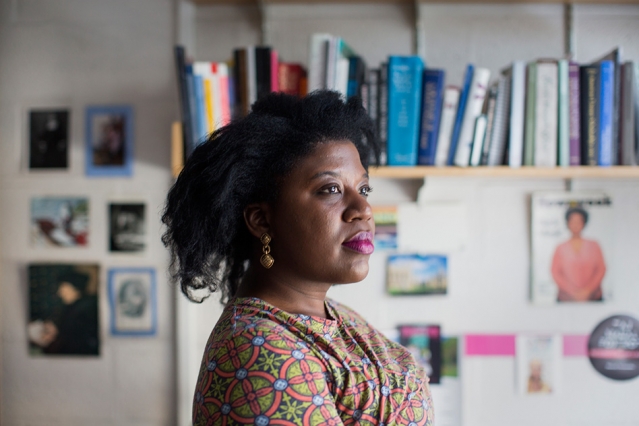Sandy Alexandre writes on black American material culture—particularly literature and photographs—examining how histories of black displacement, invisibility and vulnerability haunt and energize the ways black lives matter now.
Alexandre’s research spans the late nineteenth-century to present-day black American literature and culture. Her first book, The Properties of Violence: Claims to Ownership in Representations of Lynching (Mississippi 2012), uses the history of American lynching violence as a framework to understand matters concerning displacement, property ownership and the American pastoral ideology in a literary context. For example, in one chapter—on Toni Morrison’s Beloved (1987)—she asks readers to consider the gendered implications of seeing lynching iconography itself as a form of owned property.
Alexandre is currently writing another book From Chattels: Thinghood, Ethics, and Black Material Culture, which broadly asks two questions. The first is: After slavery, what kind of value does black life represent when value itself, particularly in the context of American race relations, is consistently measured in terms of property (cf. Cheryl I. Harris’s “Whiteness as Property”)? The second question challenges the very logics of that status quo and asks: How exactly have those who were once designated and treated as property creatively redefined the concepts of property and value altogether, particularly in American literature and culture? From Chattels traces a trajectory from the status of enslaved blacks as chattel to their status as owners, consumers, inventors and curators of personal possessions in order to determine if and how black desire manifests itself differently from a strictly consumerist model as a result of that history with slavery. Consequently, this book will be the first to study how the enforced condition of black thinghood shapes, informs and impinges on the very things that black people deliberately choose to have, desire, make and collect. Overall, Alexandre’s work takes into serious account the ways in which an ecology of people, places, and things can attempt to negotiate the various instances of racial violence that mark the aggregate of U.S. history.
Press
MIT News, Using Literature to Understand Violence Against Blacks
NYU’s Black Portraiture[s] Conferences, Abstract
Invisible Panel Discussion on Saturday, April 22, 2017 from 11:00-1:00pm

